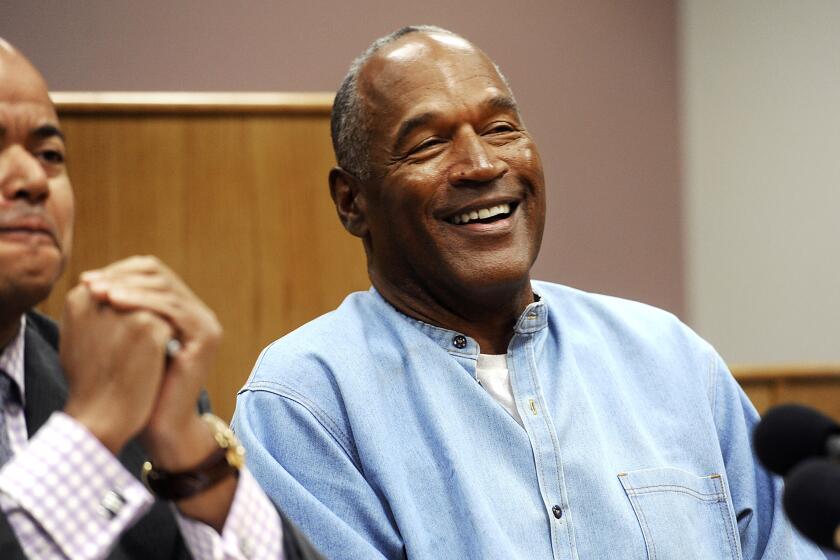Justices Rule Against Lawyer Who Took LSD : Appeals: State Supreme Court says suspects can be charged with possession even if they ingest drug before arrest. Ventura attorney faces disbarment.
In a setback for a Ventura lawyer who said he took LSD at his office to “provide a better social environment,” the California Supreme Court held Monday that people can be charged with drug possession even if they consumed the drugs before arrest.
The court said it found “some justification” for holding that ingestion of drugs by itself may not be enough to sustain a possession charge. But such a crime can be charged if there is other evidence to support it, the court found.
The ruling stems from the quirky case of Ventura lawyer Douglas Andrew Palaschak, who took two doses of LSD at his law office on his birthday in 1991. The lawyer told another employee that he was “frying on acid.” She summoned police.
Palaschak admitted to police that he had taken LSD and later told reporters that he wanted to improve the social climate in his office. The officers said he exhibited symptoms of ingestion: hallucinations, confusion, dizziness and lip licking. Both Palaschak and his secretary, who had LSD in her purse, were arrested.
The secretary testified against him at trial, and a jury found him guilty of felony possession. But a judge reduced the conviction to a misdemeanor, and the Court of Appeal in Ventura threw out the conviction on the ground that suspects cannot be charged with possessing drugs that they had already consumed. The prosecution appealed to the state Supreme Court.
The high court’s ruling came on Palaschak’s 46th birthday. He said he had expected to lose before the conservative court and called Chief Justice Malcolm Lucas, who wrote the unanimous decision, “mean-spirited.”
Palaschak is licensed to practice law, but he described his legal work as “difficult” since the LSD conviction. He attributed his problems in part to poor representation by his court-appointed lawyers and insisted that he would continue legal efforts to overturn the conviction.
The ruling will allow the State Bar of California to suspend Palaschak’s law license while attempting to disbar him, said Victoria Malloy, assistant chief trial counsel for the bar.
“I fully expect I will get a disbarment decision against him,” she said.
Malloy has been prosecuting lawyers for the State Bar for nearly 10 years, but the Palaschak case “is definitely unique,” she said.
Over the years, the bar has repeatedly sparred with Palaschak. It suspended him for traffic violations that put him in jail for eight months and charged him with practicing law without a license during that suspension.
Bar investigators took him before a judge on charges of moral turpitude for asking female job applicants to sign contracts that allowed him to make sexual advances.
He defended the contracts as necessary protection against sexual harassment charges and a way “to fully exercise one’s rights as a male.” A judge found that the contracts did not warrant bar discipline.
Palaschak said he will continue to fight the bar to keep his law license.
“Theoretically this would make sense if this were a person convicted of embezzling client funds, a felony,” Palaschak said. “But I was convicted of a misdemeanor, possession of two doses, arguably one dose depending on your personal feeling about the dosage of LSD.”
Deputy Atty. Gen. David A. Wildman, who argued for the prosecution, said he was pleased with the ruling. “I don’t think it changes the law, but it does make it much clearer,” he said. Davis attorney Glenn Durfee, who represented Palaschak, said he could not comment on the ruling because he had not read it yet.
The court’s ruling appeared to be narrow, but its ramifications were unclear. Marcia Morrissey, secretary of the California Attorneys for Criminal Justice, a criminal defense lawyers association, said the decision raises civil liberty worries, but could be interpreted as applying only to the facts of the Palaschak case.
If the ruling is limited to Palaschak’s situation, “then perhaps it is not (intruding) into principles of fairness and justice,” said Morrissey, after portions of the opinion were read to her.
More to Read
Start your day right
Sign up for Essential California for news, features and recommendations from the L.A. Times and beyond in your inbox six days a week.
You may occasionally receive promotional content from the Los Angeles Times.







